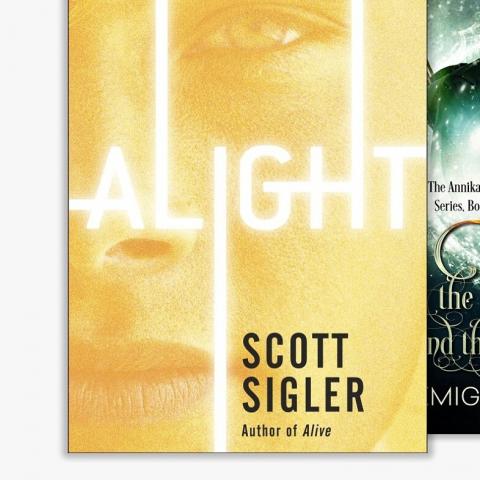{Review} Alight by Scott Sigler
Jul 24,2016
The first thing you must adhere to before picking up this novel, is that it is the second novel to the Generations Trilogy. The first was Alive by Scott Sigler. However, this review will still be spoiler free.
So early last year, July 14th, Sigler released his first novel Alive. A young little girl (or so she thought) emerges out of a coffin after much struggle and strife. The only thing she can faintly remember is that she is twelve and finds that her name contains an ‘M.’ As she only has her instinct to guide her, she comes to find more children like her, but when they come together, they all arrive to a realization that their age does not match their bodies. The inhabit bodies of young adults. Bothered and intrigued by their appearance, they work together to find out what exactly is going on. As they slowly come to understand what the prison they are in really is, the horrors of this novel truly begin to emerge. This novel featured a disturbing beginning and a world building atmosphere of strange technology but pointedly detailed. Every chapter left the reader with a cliff hanger, something I tremendously admire about a novel. I finished the read in two days and because of the quick paced reading I subjected myself to, I’ve been waiting like a child watching the closed sign of a candy store, for this second novel, Alight, to be available to the public. I finally got my hands on it late last month and was able to finish it in about three weeks per my busy schedule.
This is a book to fight for. Alight is a solid sci-fi read, ready for the young adults, yes, but adhering to an older audience as well. Like its predecessor, if you have a weak stomach for detailed violence, then this is not the book for you. Alight holds nothing back from the reader, no matter who’s viewing and covers a world wind of emotions including fear, pride, trust, and anger, but tremendously, as seen with the first novel, power. From religion, to administrators, to even non-believing leaders; there is no one who won’t stop for an assertive amount of power they deem necessary for themselves, a struggling trait that Sigler displays still holds in reality.
Beginning the novel, there is this small aspect that a lot of authors lack in which I believe Sigler successfully accomplishes: character recognition. When a reader is introduced to several characters at an abundance of time during a novel, it is often harder than not, to try and remember certain personality traits or for me, names and positions in the story. Sigler, however, subtly reintroduces each character in the beginning of Alight before specifically getting into the overall plot of the story. He uses the first person point of view per our main character ‘M’ to really dig down into the purpose and development of the others we were introduced to during the first novel.
Aside from the characters and their development, there featured excellent world building that complimented, in a sick but entertaining sense, the lost feelings of change and distrust that transpire through the various characters, both main and unimportant. Though I found some exciting cliff-hanger endings missing from this novel compared to the first, it wasn’t a huge feat for me and didn’t pull away from the story. This probably had to do with the fact that compared to the first novel, Alight holds more surprising technology and imagery per a new environment. It still held it’s many twists, especially towards the end, but didn’t overpower the reader with too much information to remember. Something to hold on to if you do read this novel is that these are all still children, in their own right. Children who are trying to lead, build, and prosper. This is a chilling element to the story that I love. We are able to see the differences between what children would do if given these responsibilities compared to that of adults while observing the scary development of similarities when children are given adult opportunities.
Though this story introduces several other emotions as I mentioned earlier, aside from trust, this novel is purely placing the spotlight on power. Power is the source of change, of support, of opportunities, but unfortunately, of evil. And evil is the greatest obstacle from this factor that the children, in my opinion must face more so with one another than the new territory they’ve arrived in.






